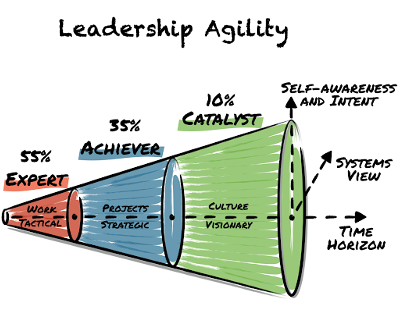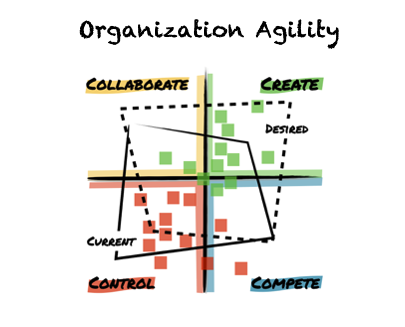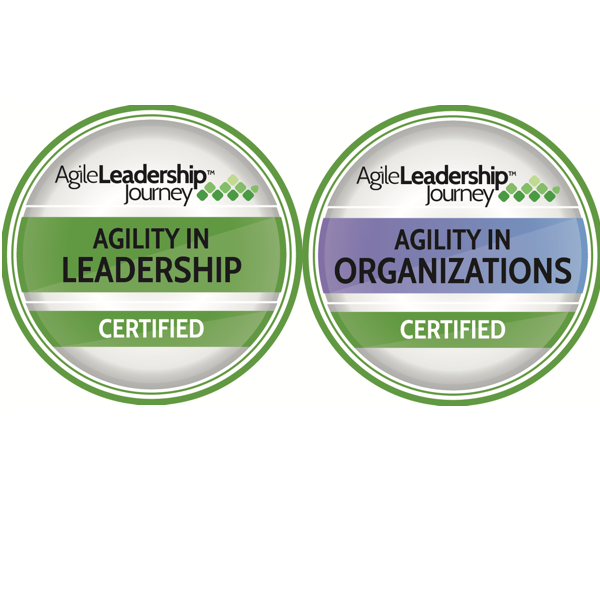This interactive leadership-focused training builds the skills and competencies to effectively guide and grow agile leaders and their organizations. This workshop is a pragmatic application of theory and provides concrete models, tools and techniques for leaders to employ directly in their own thinking, their own behaviors, and within their organizations.
Day 1 focuses on development of the individual leader
Even in the best of times, effectively leading others is seldom easy. Doing it well amid uncertain, complexity, and rapid change requires advanced skills and personal agility. Agile leaders are more self-aware of their own abilities/limitations and more attuned to the interconnected systems at play in their organizations. Therefore, they are more adept at providing situationally appropriate guidance that balanced the immediate and future needs of the organizations.
This workshop supports the development of critical leadership agility competencies through the instruction and practice of specific mindsets and behaviors.
Day 1 curriculum is as follows:
MODULE 1: AGILITY LEADERSHIP CONTEXT
Complexity, uncertainty, and the pace of disruptive change continue to escalate globally. We demonstrate the need for new ways to reduce risk, manage budgets, lead projects, and engage stakeholders.
MODULE 2: AGILE LEADERSHIP
Leadership is a choice. However, most leaders are unaware of the hundreds of choices they make each day, limiting their effectiveness. We show leaders a new path to improve engagement and effectiveness.
MODULE 3: CATALYST LEADERSHIP
Beyond servant leadership, catalyst leaders are more purposeful, creative, balanced, and adaptive. We develop proactive and positive agitators of change in the leaders themselves and others they engage.
MODULE 4: CATALYST CONVERSATIONS
Leadership is not a solo sport. We teach leaders a catalyst conversation technique to improve every discussion, decision, and team meeting with more balance, voice, and shared-ownership.
MODULE 5: CATALYST FEEDBACK
Feedback is a core principle of an empirical approach. We help leaders recognize common threats and create an environment in which to give and receive feedback in a more effective and safe manner.
MODULE 6: CATALYST HABITS
Much like with health and fitness, leadership requires a disciplined routine in order to sustain and grow. We teach leaders the importance of, and techniques to, build their new skills into disciplined growth habits.
Day 2 focuses on the leader’s role in developing an agile organization
Resilient organizations are able to successfully achieve their goals in dynamic environments and volatile situations. Like a well-rounded individual’s personality, the strength of an organization’s culture helps it defend its values even when under pressure. Agile organizations are better at adapting to new situations and innovating new solutions because the allow a broader set of acceptable individuals behaviors.
Day 2 curriculum is as follows:
MODULE 7: ORGANIZATION CULTURE & VALUES
Organizational culture is a significant barrier to increased agility. We teach leaders how to identify their culture and how the strengths and challenges of theirs may enable or inhibit agile ways of working.
MODULE 8: AGILE ORGANIZATIONS
Most agile transformations fail to deliver defined results. We show leaders the pitfalls of top-down/ bottom-up approaches and how to effectively lead an inside-out, values-based program to sustain agility.
MODULE 9: SHAPING AN AGILE CULTURE
Culture change is not posters on the wall; it is an intentional focus on values guided by leadership. We teach leaders the levers of change: structures, policies, and measures. This helps them to shape and sustain a culture of agility.
MODULE 10: LEADING AGILE CHANGE
Like agile transformations failing, most change initiatives fail as well. We teach leaders why, showing them how to avoid the pitfalls and to engage the organization to share ownership to build success.
MODULE 11: CATALYST CANVAS
Transformations are only A-to-B. Agility requires a disciplined inspect and adapt routine. We provide leaders a catalyst canvas: a simple tool to help focus, align and accelerate change that can be used routinely.
MODULE 12: AGILE COACHING
Every organization is unique. We guide both leadership teams and individual leaders in applying the techniques to their organization context and develop the next steps in shaping their organizations.
Lunch is provided both days and included in the workshop registration price.
Participants completing the program will be Agility in Leadership and Agility in Organizations recognized through Agile Leadership Journey as well as being eligible for Scrum Alliance Certified Agile Leadership Essentials (CAL-E) and Organizations (CAL-O) certifications.





